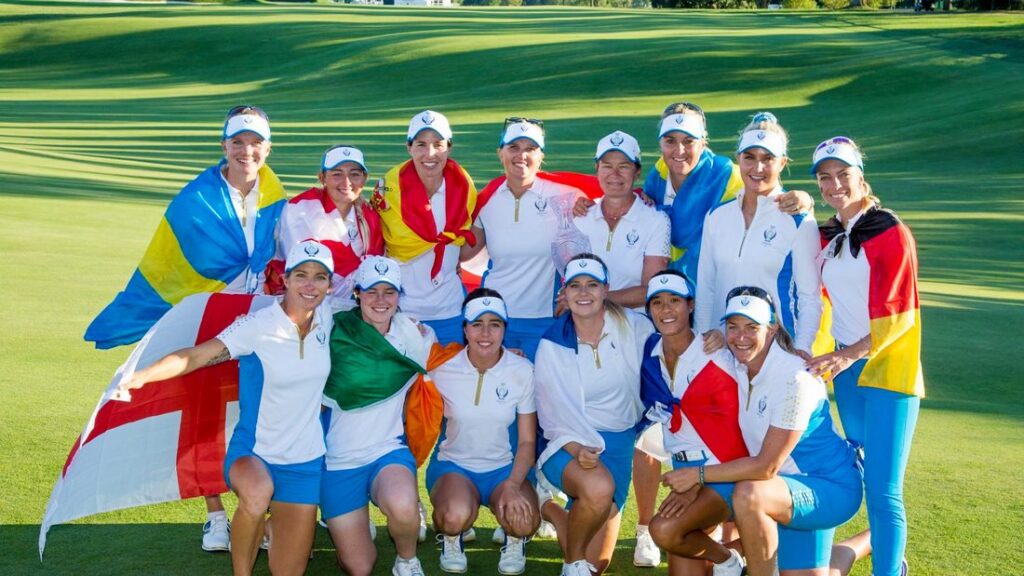Waking up after winning back-to-back #SolheimCup! ✌️ pic.twitter.com/8RFghxVDbF
— The Solheim Cup (@TheSolheimCup) September 7, 2021
Estimated reading time: 4 minutes
I guess it was appropriate that if a Scot was going to captain a victorious Solheim Cup team in America, that would happen at a place called the Inverness Club – in this case in Toledo, Ohio. Which is what came to pass on Monday, Labor Day in the United States, when the hard work put in by Catriona Matthew and her European women led them to a 15-13 victory over the United States. It was her second triumph as a skipper against the odds; she is the only European to lead two successful Solheim Cup sides.
Played in front of 130,000 spectators, very few of them Europeans due to covid ramifications, this was a stunning result, set up by the first series of foursomes, of which Europe won three and halved the other, and completed by a sharing of the singles, six points apiece. The single star performer was the Irish rookie, Leona Maquire. She won four and a half points out of five – a tough act for her to attempt to improve upon in the future!
#SolheimCup 🤝 @PGATOUR Pros pic.twitter.com/jgiQDRRq97
— LPGA (@LPGA) September 8, 2021
This was a nail-biter of a competition: 16 of the 28 matches went to the final green. Which in one respect provided an interesting, and indeed stark, comparison with events on the PGA Tour. The previous day, Patrick Cantlay had collected the $15 million prize for winning the Tour Championship. But no one other than their friends and family really cared whether or not, for example, Cantlay won or whether Jon Rahm might beat him to it. It is not just that matchplay provides better drama. The bigger deal is that golf fans become invested in who wins an international team contest. It matters to them in a way that whoever might win the Players Championship or Tour Championship never can.
We are about to get another dose of the same message at Whistling Straits in a couple of weeks time. And that fan situation can work both ways. Sure, it’s a potentially huge advantage for the Americans that the European team at the Ryder Cup, as this past week at Inverness, will not have the boisterous backing of thousands of their supporters. On the other hand, if things don’t go well for the home side, that comparatively one-way fan support could become a burden.
You want an example? One member of the American Solheim Cup team, Jessica Korda, probably reflected the kind of mindless abuse she and her colleagues received after the match on social media when she later posted: “So much hate on Twitter. Look in the mirror and ask yourself if you’d speak to your loved ones the way you speak to us. Think twice before you tweet. And stop hiding because we can see you.” She closed with a hashtag of #haveRESPECT.
So much hate on Twitter. Look in the mirror and ask yourself if you’d speak to your loved ones the way you speak to us. Think twice before you tweet. And stop hiding because we can see you. #haveRESPECT
— Jessica Korda (@Thejessicakorda) September 7, 2021
The same day, after losing to Britain’s Emma Raducanu at the US Women’s Open tennis in New York, Shelby Rogers said: “I’m going to have nine million death threats and whatnot. At this point in my career, I’d say I’m used to it. I kind of wish social media didn’t exist.”
At times social media can be an echo chamber of bile. There used to be an old saying: ‘no cheering in the press centre’. The rationale was that the inhabitants of said premises were supposed to be journalists, not fans with typewriters. That attitude looks almost quaint now. Can there be a less merry band of people than the keyboard warriors of today?
You can follow Robert Green on Twitter @robrtgreen and enjoy his other blog f-factors.com plus you can read more by him on golf at robertgreengolf.com
